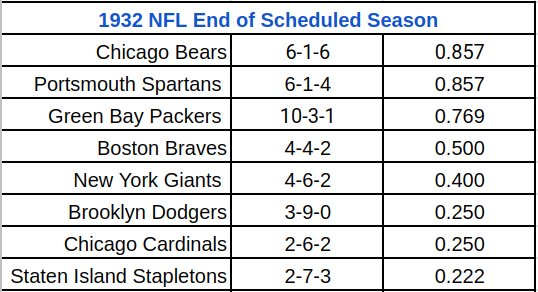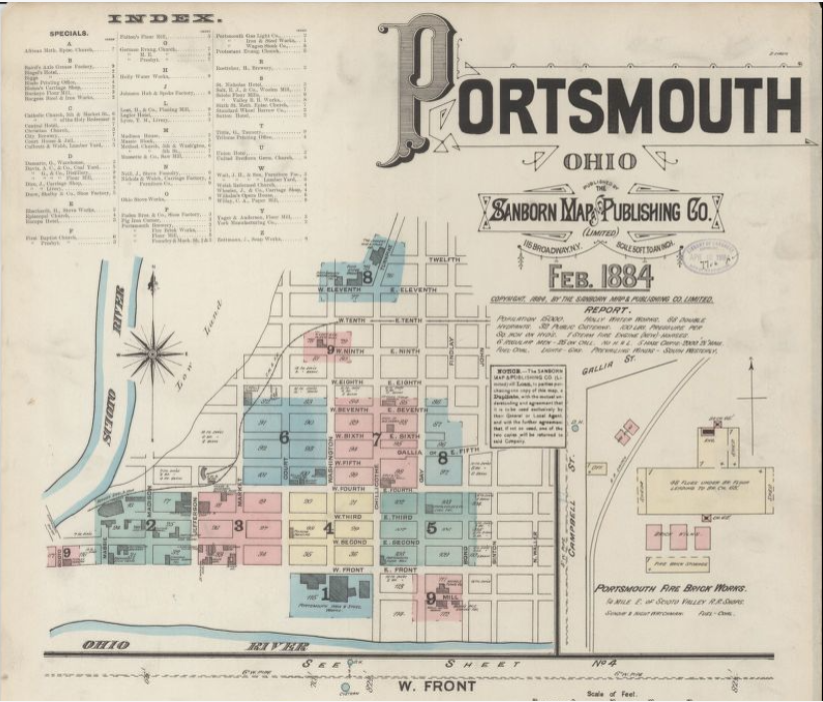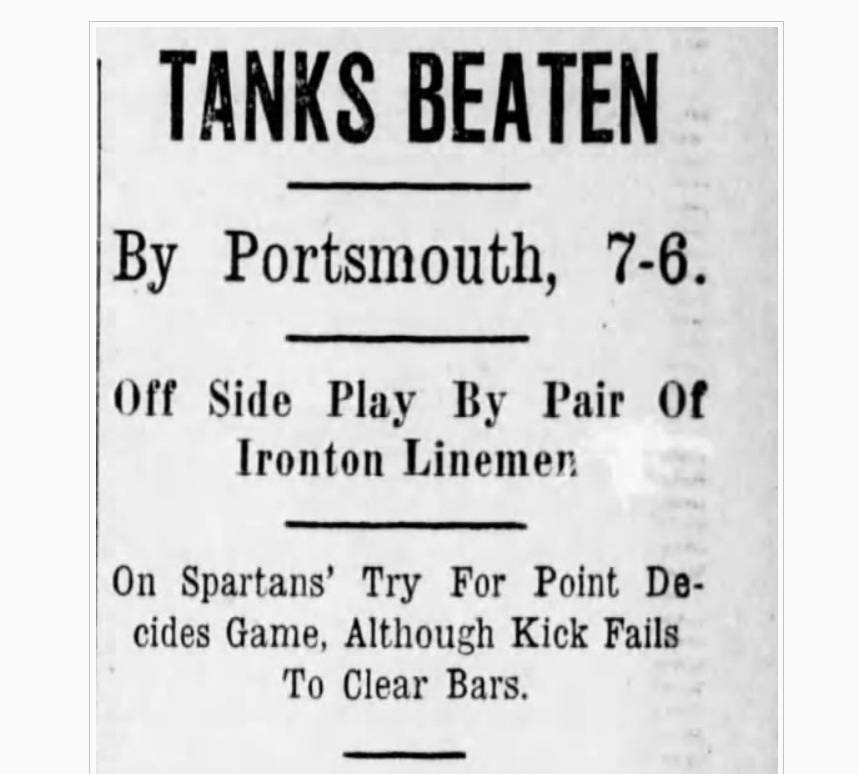In this episode we discuss one of the early small towns in pro football that experienced some success, the squad from Portsmouth, Ohio. This team at the end of two NFL seasons appeared to be on the brink of immortality only to have something devastating, and quite possibly underhanded occur to steal the League's championship from their mitts! We will provide you with a little bit of football nostalgia. This early team football history segment features the Great events, Franchise formations and the stories of these long forgotten teams in some cases that helped shaped arena of American pro football into what it is today.
Portsmouth Spartans
Franchise History
When one thinks of NFL teams they would not think of Portsmouth, Ohio as being a place the League would have ever set up shop. Portsmouth, Ohio is found about 80 miles south-east of Cincinnati, Ohio just above the Kentucky State line. In the early days of pro football, this small town came up big in gridiron history.
An 1884 Map of Portsmouth, Ohio displayed on the US Library of Congress website.
Portsmouth Spartans NFL franchise was awarded at the July 12, 1930 NFL summer meeting. According to a Pro Football Researchers Association article by C. Robert Barnett in a 1980 edition of the groups Coffin Corner Publication, the Spartans formed as a semi-pro teams in 1910 going by the names like the Shoe-Steels and Presidents. The citizens of Portsmouth despite the 1929 stock market crash, pushed for an NFL franchise. The Portsmouth National League Football Corporation was capitalized at $25,000 on June 12, 1930. To raise money, the corporation attempted to sell 250 shares of stock for $100 a share. Harry N. Snyder bought 91 shares and various other people bought 67 shares in lots of one or two shares each. The Spartans were officially granted a franchise at this July 12, 1930 league meeting. Mr. Barnett regails a story of after winning their first two NFL games over the Newark Tornadoes and the famous September 24, 1930 first professional football game under the lights.
First Night Game
The very first NFL game played under portable electric lights occured in Portsmouth, Ohio as the Portsmouth Spartans faced the Brooklyn Dodgers in a night game. The first official NFL night game under the permamnent lights took place on November 6, 1929 in Kinsley Park Stadium in Providence, RI. Reflecting back to the game in Ohio in 1930 though the Spartans defeated the Dodgers by the score of 12-0 at University Stadium which is reported to still stand to this day and is now aptly called Spartan Municipal Stadium.
The Spartans were feeling pretty good about themselves with their first two Leage games going in the "W" column. That is until they had a reality check in an independant game against their old semi-pro rivals the Ironton Tanks, in squeaking out a 7-6 win. The Ironton faithful, which hailed from Cincinnati, were a little bitter about the one point loss. The September 29, 1930 Cincinnati Enquirer claimed the extra point kick of the Spartans that failed to go over the cross bar was negated by a questionable offsides call against Ironton.
Headline from the Sept. 29, 1930 Cincinnati Enquirer via Newspapers.com
The Portsmouth Times expressed the belief that the underdog Tanks, and imparticular Keith Molesworth, a player who had been cut earlier in the season by the Spartans, had badly outplayed the Spartans. "Why wasn't Molesworth retained by the Spartans?" the Times article asked rhetorically. But all the folks in Portsmouth already knew the reason. Molesworth had been kicked off the team because of football love triangle. Molesworth had stolen and later married Portsmouth’s Head Coach Harold Griffen's sweetheart! This personal personnel decision by the coach resulted in Griffen being demoted to business manager and George "Potsy" Clark was hired as the new coach for the next season. Well the Spartans eleven ended the 1930 season with a record of 5-6-3 but they had a core of players they could build upon and this became evident two years later. Clark brought discipline to the team, shocking fans and players alike at first but the results came on game days. The Spartans won their first seven games of the 1931 campaign, allowing their opponents a total of only 16 points that was until the New York Giants knocked them from the ranks of the unbeaten. The season culminated with the first place Green Bay Packers losing to the Chicago Bears a week after the Portsmouth eleven escaped the Windy City with a win. The 12-2 Packers were scheduled to play the 10-3 Spartans in Portsmouth but the Packers brass refused to play a game where with a Portsmouth win there would be a tie for the League Championship. The Spartans protested that the game was listed on the official NFL schedule but NFL Commissioner Joe Carr sided with Green Bay thus the Packers were crowned champs and the Spartans were forced to accept a salty second place finish.
Our friends Randy and Adam Snow from the World of Football Podcast pieced together this great YouTube video giving further details on the December 4, 1932 game between the Spartans and the Packers.
More adversity as far as winning the League Title befell the Spartans in 1932. Late in the season the NFL decided that a final game to determine a Champ would be played in a special Chicago at Wrigley field on December 18, 1932. The Title was supposed to be given to the team with the best record as it had been for over a decade in the young NFL. The season though ended with the Chicago Bears and the Portsmouth Spartans in a virtual tie for the top record in the League.

It is believed that George Halas challenged the Spartans to play a game to settle the tie, they wanted no part of any type of Co-Champion bolonga. Thus we in essence had the first NFL Championship! This first postseason game in NFL history had some huge twists and turns to make it quite a remarkable story, even besides the fact that a game was going to be played to determine an NFL Champion. The first odd occurrence was that Spartans star Earl "Dutch" Clark was unable to play in the game because he had to work. While that may sound crazy to us today but the fact was that professional players of that era did not make enough to make a living all year long. Most had to take off season jobs to make ends meet, even the super stars like Dutch Clark, who worked as the Head Basketball Coach at Colorado College and his hoops team had a game on that December 18 and Dutch couldn't get off work to make the football game in Chicago. The second crazy thing that happened was that due to a freak late-fall blizzard in Chicago, the game had to be moved inside the Chicago Stadium because Wrigley was covered with deep snow and frozen with dangerous sub-zero temperatures. The playing field had to be modified to play inside, so the game was played on a field only 80 yards long, and some 30 yards narrower than the normal width the teams played on all season. The last item that took place surrounding the game happened on the contest's only touchdown. Bronko Nagurski threw a scoring jump pass to Red Grange but the Spartans argued that Nagurski did not meet the requirement of legal forward passes in those days of being 5 yards or more behind the line. The play stood and the Bears ended up winning the NFL title by the score of 9-0.
The Spartans once again many claimed were dooped out of an NFL Title a second time by the very clever and influential George Halas of the Bears just as Curly Lambeau with the Packers had just a few seasons earlier. The Spartans though had a faithful following from the citizens of Portsmouth but one circumstance outside of their control made the franchise struggle financially. The Great Depression was wraeking havok across the globe and Portsmouth was no excpetion. The Coffin Corner article goes on to say that in the book Detroit Lions, Dutch Clark was quoted as saying, "Hell, we'd get 4,000 or 5,000 people out to watch practice and at game time we'd be lucky if we had 2,000." Lineman John "Popeye" Wager added, "We were popular and everyone who could afford it came to the games, but as the depression got worse not many people could afford the ticket price."
So many great early NFL moments in the small city that loved their football team. Even Jim Thorpe, the legendary Native American halfback, regularly played for Portsmouth near the end of his career. However the franchise in Portsmouth finally succumbed to the lack of funds. On March 24, 1934 the Portsmouth franchise was sold and moved to Detroit where they have resided as the Lions ever since.
If you want to be able to be able to read through some old articles like The Cincinnati Enquirer, you need to check out Newspapers.com. At Newspapers.com, you can get access to over 640 million pages’ worth of news from the US, Canada, England, Scotland, Ireland and more dating back from 1798 to yesterday. Get a free one week subscription to Newspapers.com by visiting SportsHistoryNetwork.com/newspapers. And with a paid subscription, you’ll also be helping to support the production of this and other Sports History Network shows.







